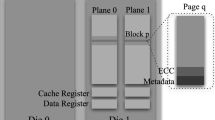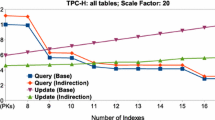
Overview
- Helps system designers better choose SSDs and shape database workloads to match their performance characteristics
- Explores the emerging research field focused on the co-design of database management systems and SSDs
- Reviews DBMS/SSD co-design via more seamless database and storage integration and SSDs adapted to database computation
Part of the book series: Synthesis Lectures on Data Management (SLDM)
Access this book
Tax calculation will be finalised at checkout
Other ways to access
About this book
Similar content being viewed by others
Keywords
Table of contents (7 chapters)
Authors and Affiliations
About the authors
Philippe Bonnet is an experimental computer scientist with a background in database systems. For thirty years, Philippe has explored the design, implementation, and evaluation of database systems in the context of successive generations of computer classes, including wireless sensor networks, computer clusters, and most recently disaggregated heterogeneous computers. Philippe is an expert on storage system software. He contributed to the uFlip Benchmark, the Linux multiqueue block layer, the Linux framework for Open-Channel SSDs, the OX architecture for computational storage, the xNVMe library, and Delilah, a prototype for eBPF offload on computational storage. Philippe has been a professor in the department of Computer Science at the IT University of Copenhagen since 2016. He is a trustee of the VLDB Endowment and currently chairs the ACM EIG on Reproducibility and Replicability.
Accessibility Information
PDF accessibility summary
EPUB accessibility summary
Bibliographic Information
Book Title: Principles of Database and Solid-State Drive Co-Design
Authors: Alberto Lerner, Philippe Bonnet
Series Title: Synthesis Lectures on Data Management
DOI: https://doi.org/10.1007/978-3-031-57877-9
Publisher: Springer Cham
eBook Packages: Synthesis Collection of Technology (R0)
Copyright Information: The Editor(s) (if applicable) and The Author(s), under exclusive license to Springer Nature Switzerland AG 2025
Hardcover ISBN: 978-3-031-57876-2Published: 07 December 2024
eBook ISBN: 978-3-031-57877-9Published: 06 December 2024
Series ISSN: 2153-5418
Series E-ISSN: 2153-5426
Edition Number: 1
Number of Pages: XV, 135
Number of Illustrations: 16 b/w illustrations, 49 illustrations in colour
Topics: Database Management, Information Storage and Retrieval, Data Storage Representation, Data Structures and Information Theory, Artificial Intelligence, Computer Hardware



